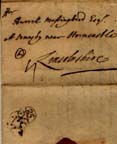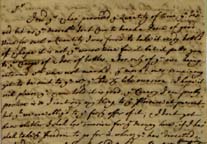These letters graciously have been shared with the Victorian Web by Eunice and Ron Shanahan; they have been taken from their website. The letters give an insight into the daily lives and concerns of 'ordinary' people without whom history would not exist. The letters are a wonderful example of how much history may be gleaned from such sources.
We have two letters addressed to Burrell Massingberd in 1717: this letter and one written by Polly Massingberd. This letter is dated June 24 1717, addressed to Hon. Burrell Massingberd Esqr, at Ormesby Near Horncastle, Lincolnshire.
 Click
on the image for a larger view
Click
on the image for a larger view
The postal markings are :- a small (14mm ½") Bishop Mark with the date 25 above the month IV (JU). The manuscript marks 'Pd' and '4'. This '4' signifies fourpence, which was the rate in force from 1711-1765 for a letter carried for a distance of more than 80 miles. Horncastle was 134 miles from London.
The letter was signed by I. Toller, and the red sealing wax impression is surprisingly clear, a shield bisected horizontally with three five pointed stars at the bottom, and in the top two corners apparently mythical beasts, either dragons or unicorns, both facing to the left.
Lord Oxford's story is an early example of what Australians call the 'tall Poppy syndrome' (which signifies that if someone rises above the rest — chop them down to size!). He was born Robert Harley on December 5, 1661 into a Presbyterian family and was first elected to Parliament in 1688 . With Paul Foley, he led a coalition of Whigs and moderate Tories opposed to the government during the reign of King William III.
Harley was Speaker of the House from 1701- 1705 and Secretary of State from 1704-1708. During this period, Harley, with John Churchill, 1st Duke of Marlborough and the Lord Treasurer Sydney Godolphin, dominated the Government of Queen Anne (1702-1714) and directed the war being waged against the French from 1701-1714. Harley became the Queen's favourite but his anti-Whig attitudes brought him into conflict with his two coalition colleagues who forced him to resign in February 1708. He then allied with the Tories, while the Whigs occupied all the major government offices. However, in 1710 public dissatisfaction with the Whig-directed war, enabled Queen Anne to dismiss Godolphin and install Harley as Chancellor of the Exchequer at the head of the Tory ministry. The next year the Queen created him 1st Earl of Oxford and made him Lord High Treasurer, making him the most powerful man in England at that time. His major accomplishments during his ministry were the formation of the South Sea Company — which had a monopoly of trade with South America, — and ending the war with France by the conclusion of a favourable Peace at Utrecht.
But what goes up, must come down, and he had a dangerous rival in his Foreign Secretary, Henry St John, 1st Viscount Bolingbroke, who discredited him with the Queen and persuaded her to dismiss him on 17 July 1714, on allegations of treason. Five days later she died, Her successor was King George I (the Elector of Hanover) an anti-Tory monarch, who spoke no English. Because of the allegations, Lord Oxford was imprisoned in the Tower to be tried for treason.
The beginning of the letter does not concern Parliamentary matters, but it shows that the drinking of wine has a long history in England. I have quoted the letter in full, and exactly as it was written, with the archaic spelling and word usage. This is most marked in the letters we have, which were written in the 18th Century. The letters written in the 19th Century are much nearer in style, and spelling to present-day English.

"I recd yrs & hav' provided ye Quantity of Wine ye desired but as ye Merchts dont care to break a piece of good wine for such a Quantity, I was forc'd to take it ready bottl'd off & hope it is not ye worse wine for it, but it putts ye to ye charge of 2 doz of bottles, 2 doz only of yr own being return'd wch were not mark'd, ye mark'd ones remaining yet to be sent to ye, wn. ye shall have ye like occasion. I hope it will please ye, & am told it is good. Ye Canary I am pretty positive is so, I can't say anything to ye Florence at present but yet we are oblig'd to ye for ye offer of it:
I dont yet know whether l shall hav' occasion for ye money here, if I hav' shall take ye ffreedom to go for it where ye hav' directed."
The letter then goes on to explain exactly what happened on 23 June 1717 in the Houses of Parliament at the trial of Lord Oxford. From the comments made by the writer, it seems as though Burrell Massingberd was in fact a member of the House of Commons.
'yesterday cam on ye tryall of Ld. Oxfd. and after Mr Hampden had open'd ye Charge generally Sr. Jos. Jekyll offer'd to proceed upon ye 1st Article for a Misdemeanor whereupon Ld.Harcourt mov'd to adjourn to yr own House, & propos'd a Question whether they ought to proceed upon ye Articles for misdemeanors till they had heard & pass'd Judgmt upon ye Articles of Treason wch. after a fine Debate, was carried in ye Negative 80 to 96.
Then ye Lds. return'd to ye Hall & ye Ld Howard reported ye Resolution of ye House to wch ye commons by ye Soll. Generll. reply'd. That they lookt upon it to be ye undoubted Right of ye Comons to proceed in ye Impeachment, after yr own Method & yet ye Resolution wd be of fatal consequence to ye Rights and Libertys of Ye Comons of Gt Britain — to wch they cd give no further answer till they had resorted back to yr own house, wh it being late, they adjourn'd to this day and hav' pray'd time to search Precedents wch ye Lds giv'n to Thursday.
Upon this tis ye generall opinion that ye Blaze is out and ye Tryall at an End.
I must beg yr Pardon for abruptly ending this after I hav told ye that.
I am, Sr. Yr Obliged and most obedient humble Servt
I Toller.'
As Mr Toller reported in this letter of 1717, the trial did not take place for nearly three years, and as he forecast, the blaze was indeed out, and Lord Oxford was acquitted of treason by his Peers, in July 1717. He spent the rest of his life in retirement, and died 21 May 1724, aged 63. If he had been found guilty of treason, he would have died sooner, as Treason carried the death sentence.
3 December 2002